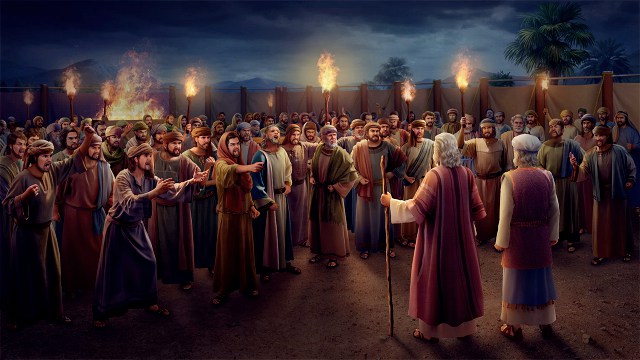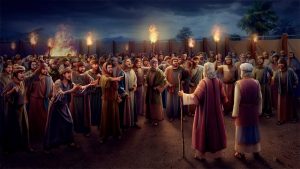Fireworks, Fire Pans, and Falling
The American Pyrotechnics Association (APA) estimates that more than 14,000 fireworks displays light up the nation’s sky each Independence Day. A gittin choidesh Tamuz and a very happy July 4th to all.
Why is this yom tov directly associated with fireworks? Seemingly it’s a tradition dating back to Philadelphia in the year 1777, when on the country’s first Independence Day mamish, while the country was still in the midst of the Revolutionary War against Britain, citizens came together to watch their new nation’s sky illuminated in a grand display meant to raise spirits. Avada we don’t ever mess with traditions.
 Over in this week’s parsha of Koirach, Moishe will introduce us to firepans and the role they played in putting down a mutiny of sorts. This one featured fireworks of another sort, one directed by the RBSO and not the famous Grucci family –a Long Island company- who are the people behind hundreds of fireworks displays yearly.
Over in this week’s parsha of Koirach, Moishe will introduce us to firepans and the role they played in putting down a mutiny of sorts. This one featured fireworks of another sort, one directed by the RBSO and not the famous Grucci family –a Long Island company- who are the people behind hundreds of fireworks displays yearly.
Firepans? Where have we seen them before? Lommer lernin (let’s learn), ober let’s first lay the groundwork. Parshas Koirach begins by telling us that Koirach separated himself, along with Doson and Aviram (Dathan and Abiram for those who only saw the movie and never learned the heylige Toirah), and a fellow by the name of Oin from Sheyvet Reuvain (tribe of Reuven). What’s pshat separated himself? Did he leave his wife? The heylige Toirah then states, in a seemingly repetitious manner, that they stood before Moishe along with two hundred and fifty men, and that they gathered again together before Moishe and Aharoin. The entire confrontation could seemingly have been reported in one sentence, ober if the RBSO chose to repeat the facts, mistama we need to learn them. Why, is none of your business! The bottom line was that Koirach, Doson, Avirom and Oin ben Peles – he, most well known for sheva brochis speeches given during this time of year- got into a dispute with Moishe. About what? Money? Were they in a business deal that went sour? Seemingly it was only about kuvid (honor); Koirach, his cohorts and supporters, were seemingly upset over being passed over for jobs and assignments they thought should have come their way. Shoin: perhaps Koirach was the first disputant over such issues, zicher not the last. Perhaps he was but a trailblazer as fights over kovod (honor and respect) are regular occurrences almost weekly in kimat every shul. Other, suggest a more sinister confrontation, we will discuss that below.
What was seemingly unique about Koirach and his followers was this: in contrast with the constant defiance of the Yiddin – as we will continue learning in the upcoming parshas as the Yiddin continue their midbar trek, and let’s not forget about parshas already read- was this: Koirach’s rebellion was instigated, not by the erev rav, the riffraff, or even Doson and Avrom, long established Toirah rabble-rousers, but by a very choshova (noble) Koirach who was the great-grandson of Levi, with support of “two hundred and fifty princes of the assembly, those summoned for meeting, men of renown.” Says Rashi: they were “wise men,” who knew well the severe penalty for offering incense illicitly. The bottom line: at times, wise men, if you chap, also get into trouble. Who are we, or you, to judge? Shoin.
Bikitzur (in short, or to sum it all up), the machloikes went azoy: Koirach, a Levi, who shared the same grandfather (Kihos) and great-grandfather (Levi) with Moishe and Aharoin, was displeased that Aharoin and his descendants were singled out for the kihuna (priesthood) while he, being from a different branch of the same family, and a guy with real money, had gornisht, no priestly status. Koirach was an ”imfaginer” (insanely jealous person) and incited a mutiny challenging Moishe’s leadership. Moreover, he wasn’t too pleased with the fact that Aharoin (Moishe’s brother) was appointed as the first ever kohian (priest); epes he suspected Moishe of a shtikel nepotism. Says the medrish: Koirach said to Moishe, “We have one G‑d and one high priest, and you all would like to be that high priest. Know, then, that I too desire the same.”
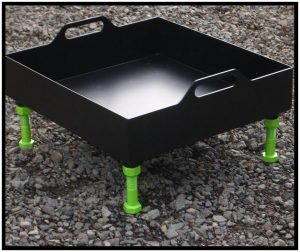 Next: He enlisted another two protagonists, Moishe’s inveterate foes from way back (parshas Shemois) by the names of Doson and Avirom and together they were joined by another 250 Yiddin, each a leader of sorts. Forgot Doson and Avirom? They are the two fellows who earlier in Moishe’s career, having slain the Egyptian taskmaster, confronted Moishe with the words, “who made you an important personage to be a minister and judge over us.” (Shemois 2:14, Rashi). To no one’s surprise, all 250 were avada distinguished members of the community; who else gets fight for more kovod but those already empowered? You can smell the trouble brewing: smelling was the operative term as we will learn below when Moishe tells all 250 of Koirach’s followers to offer the sacrosanct ketoires (incense) as a test of their worthiness for the priesthood. They will offer these sacrifices in fire pans as we will learn just below. Ober, let’s begin with a few questions.
Next: He enlisted another two protagonists, Moishe’s inveterate foes from way back (parshas Shemois) by the names of Doson and Avirom and together they were joined by another 250 Yiddin, each a leader of sorts. Forgot Doson and Avirom? They are the two fellows who earlier in Moishe’s career, having slain the Egyptian taskmaster, confronted Moishe with the words, “who made you an important personage to be a minister and judge over us.” (Shemois 2:14, Rashi). To no one’s surprise, all 250 were avada distinguished members of the community; who else gets fight for more kovod but those already empowered? You can smell the trouble brewing: smelling was the operative term as we will learn below when Moishe tells all 250 of Koirach’s followers to offer the sacrosanct ketoires (incense) as a test of their worthiness for the priesthood. They will offer these sacrifices in fire pans as we will learn just below. Ober, let’s begin with a few questions.
From a careful reading the pisukim, were Koirach, Doson, Avirom and their followers all involved in but one big dispute? Were there additional issues? Was Koirach in cahoots with Doson and Avrirom? What about Oin? Or, did each have their own distinct issues with Moishe? Let’s find out. Says the Abarbanel so gishmak, azoy: there were actually three separate disputes. Erhstens, Koirach claimed that the office of the Koihen Godol (high priest) should have gone to him and not to Aharoin. Koirach wanted the kihuna (priesthood)! And taka given his wealth – he was, according to legend and medrish- the richest man in the world and mistama used to buying what he wanted. To add salt to Koirach’s wound, leadership of the Yiddin went to Moishe, as he was the son of Levi’s first-born, Amrom. Koirach seemingly felt slighted because the position of Koihen Godol should have -in his mind- gone to him, as he was the son of Levi’s second-born, Yitzhar. Are you following all this? Veyter. The bottom line: he was jealous over being passed over.
Concurrently, or so a few, and the Abarbernel believe, there was a second dispute, this one between the bichoirim (first-born) from all the tribes and the tribe of Levi. At least some of them were angered by the fact that the privilege of serving in the Mishkan (Tabernacle) was taken away from the bichoirm and given to the tribe of Levi. Wait: there’s more! A third dispute involved the tribe of Reuven, represented by Doson, Aviram, and Oin, who claimed that the privilege of royalty should have gone to them as offspring of Yaakov’s first-born, and not to the tribe of Yehuda.
Does the heylige Toirah tell us that there was more than one complaint against Moishe? It does not! Ober it does repeat the facts in two consecutive pisukim, and given that the heylige Toirah does not -so we are taught- have any extra words, and given that it appears to the naked eye that the story is repeated, and given that we could have learned all we need to know from one posuk, the Abarbenel and others figured out that the repetition comes to teach us that when Koirach took (the first words of the parsha are “Koirach took”), what the words mean is that Koirach took along Doson, Avirom and Oin, they from Sheyvet Reuvain so that they could present their complaints. He also brought along representatives from Sheyvet Levi (Levites), and another 250 followers, they the bichoirm (first born) from other tribes, so that they too could press Moishe on issues on their minds. Says the heylige Toirah (Bamidbar 16:1), azoy:
1. Koirach the son of Yitzhar, the son of Kihos, the son of Levi took [himself to one side] along with Doson and Aviram, the sons of Eliahov, and Oin the son of Peles, descendants of Reuvain. |
אוַיִּקַּ֣ח קֹ֔רַח בֶּן־יִצְהָ֥ר בֶּן־קְהָ֖ת בֶּן־לֵוִ֑י וְדָתָ֨ן וַֽאֲבִירָ֜ם בְּנֵ֧י אֱלִיאָ֛ב וְא֥וֹן בֶּן־פֶּ֖לֶת בְּנֵ֥י רְאוּבֵֽן: | |
 Shoin: what did Koirach take? People to support his cause and help lead a mutiny against Moishe’s leadership. Efsher they felt Moishe was an unworthy leader. In the first smear campaign recorded in the heylige Toirah, Koirach and his supporters painted Moishe as a corrupt politician who in an act of blatant nepotism succumbed to the seduction of power, appointing his brother Aharoin as the kohain godol. In our times, a number of Democrats –taking a page out of the heylige Toirah (lihavdil)- are also claiming that our commander in chief is illegitimate, that he engages in nepotism by keeping titular positions in the mishpocho. Grada, for the Yiddin, this has all been a blessing, one not seen since the days of Mordechai and Esther. The bottom line: they accused Moishe of chapping all the great jobs and giving them to his close family members. Moishe was also accused of another form of chapping, if you chap, we shall address that below; hlat zich eyn (keep your pants on). Veyter. The bottom line: thousands of years before leaders attempted a mutiny by talk of impeachment, the heylige Toirah taught us all about challenging legitimately appointed leadership. Veyter.
Shoin: what did Koirach take? People to support his cause and help lead a mutiny against Moishe’s leadership. Efsher they felt Moishe was an unworthy leader. In the first smear campaign recorded in the heylige Toirah, Koirach and his supporters painted Moishe as a corrupt politician who in an act of blatant nepotism succumbed to the seduction of power, appointing his brother Aharoin as the kohain godol. In our times, a number of Democrats –taking a page out of the heylige Toirah (lihavdil)- are also claiming that our commander in chief is illegitimate, that he engages in nepotism by keeping titular positions in the mishpocho. Grada, for the Yiddin, this has all been a blessing, one not seen since the days of Mordechai and Esther. The bottom line: they accused Moishe of chapping all the great jobs and giving them to his close family members. Moishe was also accused of another form of chapping, if you chap, we shall address that below; hlat zich eyn (keep your pants on). Veyter. The bottom line: thousands of years before leaders attempted a mutiny by talk of impeachment, the heylige Toirah taught us all about challenging legitimately appointed leadership. Veyter.
Shoin, whether the machloikes arose from but one issue or involved three separate ones, ver veyst? We don’t know with certainty because the heylige Toirah does not specifically clarify the issues. The bottom line: though Koirach was the main protagonist, he still scored a parsha in his name. And whether or not, the other issues – those involving the Liviyim and royalty, were independent, ver veyst?
And how did Moishe react? Rather than admonishing them for their unmitigated chutzpah, mamish an act of brazen disrespect, he tells them that the RBSO will be the One to decide who is correct. Ober the heylige Toirah tells us that first he fell on his face and we shall explore this falling on his face soon. As a way of proving that Aharoin was the right choice, chosen by the RBSO Himself, and that Koirach and his men were unworthy of the priesthood, Moishe called his dissenters to a public duel of sorts. Moishe’s response to the disputant’s complaints as recorded on the heylige Toirah (Bamidbar 16:5-7) was azoy:
“…In the morning, G‑d will make known the one who is His own and the holy one, and He will draw him close to Himself . . . Do this: Take for yourselves fire-pans—Koirach and [your] entire assembly—and put fire in them and place incense upon them before G‑d tomorrow. Then the man who G‑d will choose—he is the holy one.
Vus epes fire pans? What was Moishe planning? Is this the first mention of fire pans in the heylige Toirah? Though most oisvorf reader no longer recall – mamish a shnada- let’s hearken back to parshas Shimini where we learned that Aharoin lost two children when a fire came down from the RBSO and consumed them. Says the heylige Toirah (Vayikro 10:1-2) azoy:
| 1. And Aharoin’s sons, Nodov and Avihu, each took his pan, put fire in them, and placed incense upon it, and they brought before the Lord foreign fire, which He had not commanded them.
|
אוַיִּקְח֣וּ בְנֵי־אַֽ֠הֲרֹ֠ן נָדָ֨ב וַֽאֲבִיה֜וּא אִ֣ישׁ מַחְתָּת֗וֹ וַיִּתְּנ֤וּ בָהֵן֙ אֵ֔שׁ וַיָּשִׂ֥ימוּ עָלֶ֖יהָ קְטֹ֑רֶת וַיַּקְרִ֜יבוּ לִפְנֵ֤י יְהֹוָה֙ אֵ֣שׁ זָרָ֔ה אֲשֶׁ֧ר לֹ֦א צִוָּ֖ה אֹתָֽם: | |
| 2. And fire went forth from before the Lord and consumed them, and they died before the Lord. | בוַתֵּ֥צֵא אֵ֛שׁ מִלִּפְנֵ֥י יְהֹוָ֖ה וַתֹּ֣אכַל אוֹתָ֑ם וַיָּמֻ֖תוּ לִפְנֵ֥י יְהֹוָֽה: |
Fire pans and fire? What happened there was mamish recalled by Moishe who was there. He knew that Nodov and Avihu died when they each took their fire pans and brought a strange fire. Seemingly, those who inappropriately played with fire and fire pans got consumed. Moishe chapped that Koirach and his people were inappropriate, not worthy of the priesthood, not worthy of brining incense to the RBSO, that such incense in fire pans in the wrong hands, would consume them. They would be found to be illegitimate. Moreover, says the Lubabitcher Rebbe (may he rest in peace and come back soon): the choice of fire-pans and incense was chillingly appropriate, as it recalled the lofty service performed exclusively by the Koihen Godol (high priest) on Yom Kippur, as well as the death penalty that awaited any stranger who engaged in this forbidden rite. Mamish gishmak!
Earlier we mentioned that Moishe was accused of another form of chapping, what was it? Nu, let’s first read the posik innaveynig. Says the heylige Toirah (Bamidbar 16:4), azoy:
| 4. Moses heard and fell on his face. | דוַיִּשְׁמַ֣ע משֶׁ֔ה וַיִּפֹּ֖ל עַל־פָּנָֽיו: |
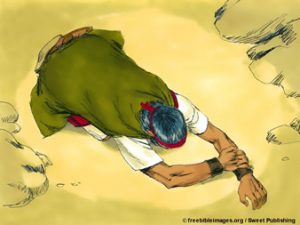 He fell on his face? Mamish? Did he faint? What caused Moishe to fall on his face? Was this the first time he heard Yiddin complain? Not! While many commentaries discuss the nature of this falling — was it prayer, or perhaps something else, says Rashi: he fell on his face because of the dispute. Ober, how did Moishe react previously when issues arose? Did he always fall on his face? His reaction when the Yiddin challenged the RBSO, and when they challenged him? Rashi tells us that in each instance Moishe had a different reaction. When the Yiddin built the eygel (golden calf), Moishe responded by reciting “Vayichal Moishe” (Moishe pleaded); when the Yiddin complained about their menu, we find the words “Va’yispalale Moishe (Moishe prayed); and in response to the miraglim caper (last week), when the RBSO again expressed His desire to kill the Yiddin and start over, we find Moishe answering with these words: “Vayoimer Moishe” (Moishe said to the RBSO). Ober this time, when he heard the complaints from Koirach and his cohorts, he fainted and fell down? What’s pshat? One might think he would have fallen when hearing the RBSO express a desire of annihilation, ober that was not his response. Yet he just pleaded; ober here a few words from Koirach and Moishe fell down?
He fell on his face? Mamish? Did he faint? What caused Moishe to fall on his face? Was this the first time he heard Yiddin complain? Not! While many commentaries discuss the nature of this falling — was it prayer, or perhaps something else, says Rashi: he fell on his face because of the dispute. Ober, how did Moishe react previously when issues arose? Did he always fall on his face? His reaction when the Yiddin challenged the RBSO, and when they challenged him? Rashi tells us that in each instance Moishe had a different reaction. When the Yiddin built the eygel (golden calf), Moishe responded by reciting “Vayichal Moishe” (Moishe pleaded); when the Yiddin complained about their menu, we find the words “Va’yispalale Moishe (Moishe prayed); and in response to the miraglim caper (last week), when the RBSO again expressed His desire to kill the Yiddin and start over, we find Moishe answering with these words: “Vayoimer Moishe” (Moishe said to the RBSO). Ober this time, when he heard the complaints from Koirach and his cohorts, he fainted and fell down? What’s pshat? One might think he would have fallen when hearing the RBSO express a desire of annihilation, ober that was not his response. Yet he just pleaded; ober here a few words from Koirach and Moishe fell down?
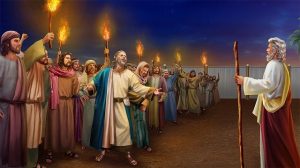 Says the Avi Ezer azoy: he fell on his face willingly. Ober says the Kli Yokor something astonishing mamish, azoy: referencing the heylige Gemora (Sanhedrin 109 or 110), he says what caused Moishe to fall or faint and fall was not Koirach’s original complaint of nepotism. Instead it was nepotism of a different form. Moishe heard that he was being suspected of chapping from another woman, he was being suspected of adultery mamish –say it’s not so please. So happens that the heylige Toirah tells us nothing of the sort, ober the Gemora elaborates. What in Koirach’s words would cause Moishe to hear he was being suspected of adultery? Says the Mishkenot Yaakov HaSefardi in Mayana shel Tora: When Moishe heard Koirach say, “All of them (the Jewish People) are holy,” the implication was that “they are all holy – but you Moishe are not!” The diametrical opposite of holiness is immorality. When Moishe heard that implicit but inescapable accusation, he fell to the ground. Ober isn’t that absurd mamish? Moishe? Avada the Oisvorfer would chap this concept if such words were uttered against kimat anyone else, ober Moishe? Ober the Kli Yokor alludes to the following: when Koirach states that Moishe lords over people, what he meant was Moishe was acting arrogantly by appointing Aharoin and when someone is arrogant, he feels he can achieve anything, with anyone, including a man’s wife. Yikes!
Says the Avi Ezer azoy: he fell on his face willingly. Ober says the Kli Yokor something astonishing mamish, azoy: referencing the heylige Gemora (Sanhedrin 109 or 110), he says what caused Moishe to fall or faint and fall was not Koirach’s original complaint of nepotism. Instead it was nepotism of a different form. Moishe heard that he was being suspected of chapping from another woman, he was being suspected of adultery mamish –say it’s not so please. So happens that the heylige Toirah tells us nothing of the sort, ober the Gemora elaborates. What in Koirach’s words would cause Moishe to hear he was being suspected of adultery? Says the Mishkenot Yaakov HaSefardi in Mayana shel Tora: When Moishe heard Koirach say, “All of them (the Jewish People) are holy,” the implication was that “they are all holy – but you Moishe are not!” The diametrical opposite of holiness is immorality. When Moishe heard that implicit but inescapable accusation, he fell to the ground. Ober isn’t that absurd mamish? Moishe? Avada the Oisvorfer would chap this concept if such words were uttered against kimat anyone else, ober Moishe? Ober the Kli Yokor alludes to the following: when Koirach states that Moishe lords over people, what he meant was Moishe was acting arrogantly by appointing Aharoin and when someone is arrogant, he feels he can achieve anything, with anyone, including a man’s wife. Yikes!
And says Targum Yoinoson: Moishe heard that people were jealous of their wives and suspected him of chapping to the extent that they requested to have their wives drink of the Soitah water on his account. And when Moishe heard this, he fell on his face, out of shame. Say it’s not so please. What is going on here? Says the Medirsh (Tanchuma Perek 10), azoy: Moshe heard that Koirach and his rebels suspected him of having relations with their wives. Said Dovid Hamelech (King David) in Tihilim (106:16): “they were jealous of Moishe in the camp”. Their claim was that his chapping would occur when their wives came for advice to Moishe’s tent. They took their wives to be tested with the water of Soitah- “the wayward woman” who is suspected of being with a man other than her husband. Ober, how could Moshe, the redeemer and savior of the Yiddin, who brought them to Har C’nai (Mt. Sinai) to receive the heylige Toirah, be suspected of such a thing!? Nu, our sages and rabbis give several reasons:
Says the heylige Gemora (Soitah 4B): that a haughty person is regarded as though he indulged in all forbidden relationships. Koirach and his assembly accused Moishe and Aharoin of being haughty and of raising themselves above the people; they said ”Why do you exalt yourselves over the congregation of HaShem?” The Gemora goes veyter: a person who is haughty of spirit will ultimately fall into the sin of cohabiting with a married woman. Koirach therefore deduced that if Moishe set himself above the people, he must have also failed in the area of sexual immorality, say it’s not so. Wait: there’s more! Says the Gemora: after hearing the prophecy of Eldad and Meidad that Moishe would not enter the land of Israel (we will read that next week), Koirach and his cohorts started to suspect Moishe. They knew that the land of Israel does not tolerate sexual immorality. They therefore assumed that this applied to Moishe.
The bottom line: avada Moishe had clean hands: not all who are suspected are guilty; ober the charges are enough to make a person faint and fall on his face in shame.
A gittin Shabbis-
The Heylige Oisvorfer Ruv
Yitz Grossman
